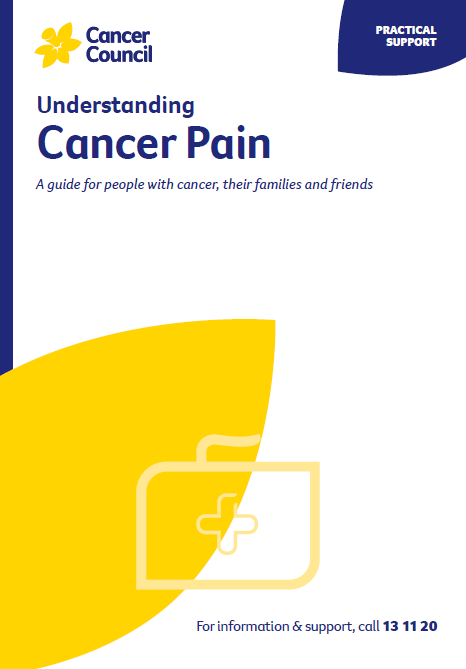- Home
- About Cancer
- Managing side effects
- Pain and cancer
- Pain after treatment
Pain after treatment
After treatment for cancer, some people will have ongoing pain for months or years. This is called chronic pain (or persistent pain) and may affect 40% of survivors.
Chronic pain may be caused by cancer treatments, cancer-related changes (e.g. reduced strength, injuries) or other conditions not related to the cancer such as arthritis. Anxiety, depression, fatigue and trouble sleeping can also make pain worse.
Learn more about:
- Using opioids for chronic pain
- Dealing with feelings of sadness
- Developing a pain management plan
- Ways to manage persistent pain after treatment
Using opioids for chronic pain
While opioids are sometimes prescribed for chronic pain, research shows that using opioids for a long time is not safe. However, for people with advanced cancer and who are receiving palliative care, opioids usually work well and are safe for managing cancer-related pain.
Evidence shows that opioids are not very useful or safe for managing chronic non-cancer pain. Chronic cancer pain after cancer treatment needs to be managed in a similar way to chronic non-cancer pain. This means looking at the physical, emotional and social impacts of the pain, and managing all these factors.
Your doctor may recommend you see a pain management specialist in a multidisciplinary pain clinic. The specialist can recommend a range of pain-relieving therapies and help create a pain management plan to improve your quality of life and return you to your normal activities. If the pain cannot be well controlled, the focus will shift to improving your ability to function despite the pain.
Dealing with feelings of sadness
If you have continued feelings of sadness, have trouble getting up in the morning or have lost motivation to do things that previously gave you pleasure, you may be experiencing depression. This is quite common among people who are dealing with pain.
Talk to your GP, because counselling or medication – even for a short time – may help. Some people can get a Medicare rebate for sessions with a psychologist. Ask your doctor if you are eligible. Cancer Council may also run a counselling program in your area.
For information about coping with depression and anxiety, call Beyond Blue on 1300 22 4636. For 24-hour crisis support, call Lifeline 13 11 14.
Developing a pain management plan
An important part of treating chronic pain is a pain management plan. This is a written document setting out your goals for managing pain, what medicines and other strategies could help, possible side effects, and ways to manage them. The pain management plan should also include details about when and who to call if you have problems.
A pain management plan is developed between the person with pain, their GP and the pain management team.
The pain management plan should be reviewed regularly. This is an opportunity to discuss any new pain, changes to existing pain and any side effects. Make sure you have a copy of the plan and share it with your health care professionals. Download a pain management plan template and other self-management resources.
→ READ MORE: Ways to manage persistent pain after treatment
Podcast: Managing Cancer Pain
Listen to more episodes from our podcast for people affected by cancer
More resources
Professor Paul Glare, Chair of Pain Medicine, Northern Clinical School, Faculty of Medicine and Health, The University of Sydney, NSW (clinical update); Dr Tim Hucker, Pain Specialist, Northern Beaches Hospital, Director, Northern Beaches Pain Management, NSW (clinical update); Dr Keiron Bradley, Palliative Care Consultant, Bethesda Health Care, WA; A/Prof Anne Burke, Co-Director Psychology, Central Adelaide Local Health Network, President, Australian Pain Society, Statewide Chronic Pain Clinical Network, SA, School of Psychology, The University of Adelaide, SA; Tumelo Dube, Accredited Pain Physiotherapist, Michael J Cousins Pain Management and Research Centre, Royal North Shore Hospital, NSW; Prof Paul Glare (see above); Andrew Greig, Consumer; Annette Lindley, Consumer; Prof Melanie Lovell, Palliative Care Specialist HammondCare, Sydney Medical School and The University of Technology Sydney, NSW; Caitriona Nienaber, 13 11 20 Consultant, Cancer Council WA; Melanie Proper, Pain Management Specialist Nurse Practitioner, Royal Brisbane and Women’s Hospital, QLD; Dr Alison White, Palliative Medicine Specialist and Director of Hospice and Palliative Care Services, St John of God Health Care, WA.
View the Cancer Council NSW editorial policy.
View all publications or call 13 11 20 for free printed copies.

